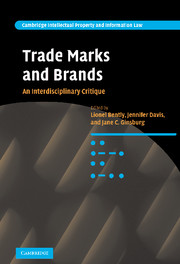Book contents
- Frontmatter
- Contents
- List of figures and tables
- Notes on the contributors
- Editors' preface
- Table of cases
- Table of statutes
- Part I Legal and economic history
- Part II Current positive law in the EU and the USA
- Part III Linguistics
- Part IV Marketing
- Part V Sociology
- Part VI Law and Economics
- Part VII Philosophy
- Part VIII Anthropology
- 15 An anthropological approach to transactions involving names and marks, drawing on Melanesia
- 16 Traversing the cultures of trade marks: observations on the anthropological approach of James Leach
- Part IX Geography
- Bibliography
- Index
- Titles in the series
15 - An anthropological approach to transactions involving names and marks, drawing on Melanesia
Published online by Cambridge University Press: 13 April 2010
- Frontmatter
- Contents
- List of figures and tables
- Notes on the contributors
- Editors' preface
- Table of cases
- Table of statutes
- Part I Legal and economic history
- Part II Current positive law in the EU and the USA
- Part III Linguistics
- Part IV Marketing
- Part V Sociology
- Part VI Law and Economics
- Part VII Philosophy
- Part VIII Anthropology
- 15 An anthropological approach to transactions involving names and marks, drawing on Melanesia
- 16 Traversing the cultures of trade marks: observations on the anthropological approach of James Leach
- Part IX Geography
- Bibliography
- Index
- Titles in the series
Summary
Introduction
Social Anthropology is the comparative study of social forms. Social anthropologists seek to understand the ongoing constitution of persons, institutions, values and cultures through a combination of in-depth analytic engagement with particular societies, and through a comparative methodology. Juxtaposing principles and assumptions discernible in one social and cultural situation with those in another yields understandings of the development and constitution of the social reality under scrutiny. It also exposes assumptions relevant to the constitution of the society of the analyst that otherwise might remain hidden. The ideal is to learn something about both other peoples' social and conceptual worlds, and simultaneously about one's own through this comparative method.
This chapter, written by a social anthropologist, seeks to throw light on the subject of trade marks. In it, I focus upon the generation of the value which trade marks have been designed to protect. I then look at how that protection (of the value generated) through the system of trade marks influences the form that transactions take, and how it inflects the outcomes (objects, persons) of these relations for the parties involved. My focus then is upon the ongoing generation of value in social processes, and how the law comes to shape that value. To achieve this end, comparative material on the ownership and transaction of names and marks relating to identity is introduced. This comparative material is drawn from Papua New Guinea.
- Type
- Chapter
- Information
- Trade Marks and BrandsAn Interdisciplinary Critique, pp. 319 - 342Publisher: Cambridge University PressPrint publication year: 2008
- 13
- Cited by



